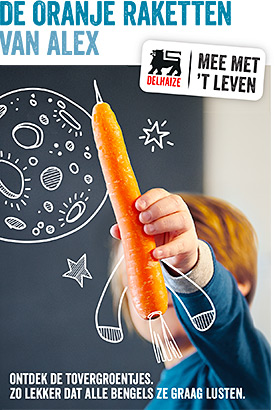4. RESULTS
Business objectives
Delhaize managed to uplift sales of the Magical veggie products with 89% on average. Next, the overall vegetable sales increased with +13%, resulting in a higher value share for Delhaize in the vegetables category. On the longer term, the campaign had a lasting effect on the growth of the vegetable category at the affiliates of Delhaize. Finally, the campaign achieved its ultimate goal: increase market share among the underrepresented target group of families with young kids. Its market share in value rose significantly with +35% year over year.
Perception objectives
The campaign managed to strengthen our health perception and Delhaize regained its top position as the retailer that 'helps people making healthier choices'.
Behavior objectives
Delhaize managed to enter the everyday popular culture of parents and their kids with their Magical veggie campaign. A strong increase in positive word of mouth and free publicity in newspapers and national news, led to the ultimate surprise: The Magical veggies appeared in Belgium's most popular quiz on national TV, resulting in a hilarious TV moment that went viral afterwards.
Overall, the Magical veggies campaign was highly effective in reaching its objectives. Although its main purpose was to drive brand meaningfulness to turn around the dropping market shares, the initiative had a high ROI as well. For each €1 spent on the campaign, Delhaize had a return of €3,54.
Up until today, the Magical veggies campaign remains the symbol of the strategic shift Delhaize undertook in 2018, the year it was finally reversing its long-lasting drop in market shares to a positive increase. Last but not least, Delhaize decided to repeat the Magical veggie campaign in 2019.
|










